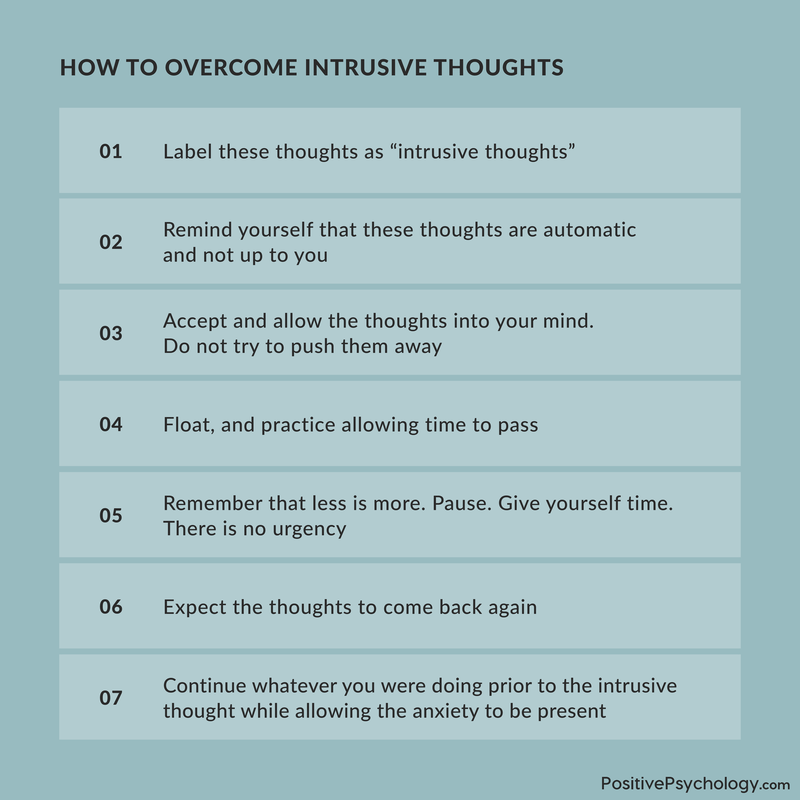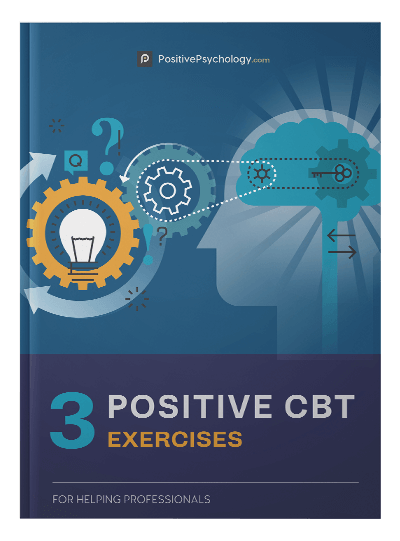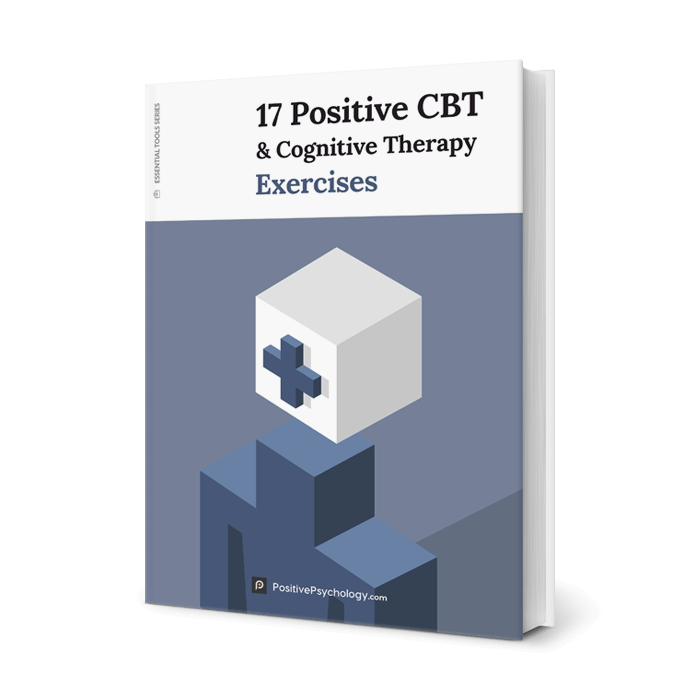What Are Intrusive Thoughts in OCD & How to Get Rid Of Them?
 Do you ever have intrusive thoughts popping into your head, unbidden and seemingly from thin air?
Do you ever have intrusive thoughts popping into your head, unbidden and seemingly from thin air?
You might be just going about your day when—suddenly—your mind throws a crazy image or a bizarre thought at you, and you’re left scratching your head about what just happened.
The thought could be benign, like doing something embarrassing or socially unacceptable in public, or it could be more disturbing, like a thought about harming someone that you would never really want to harm.
Whatever random thought that you’ve found squatting in your mind’s territory, don’t worry—you’re not alone.
Before you read on, we thought you might like to download our three Positive CBT Exercises for free. These science-based exercises will provide you with a detailed insight into Positive CBT and will give you additional tools to address intrusive thoughts in your therapy or coaching.
This Article Contains:
- What are Intrusive Thoughts: Meaning/Definition?
- What Causes Intrusive Thoughts and Are they Normal?
- Examples of Intrusive Thoughts: About Death, In Relationships, During Climax, and Violent in Nature
- Intrusive Thoughts and Other Mental Health Issues
- False Memories and Other Symptoms
- Treatment Options: Therapy, Hypnosis, and Medications
- Self Help: Managing Intrusive Thoughts (including CBT worksheet)
- Book Recommendations
- A Take-Home Message
- References
What Are Intrusive Thoughts: Meaning/Definition
Intrusive thoughts are thoughts that enter your consciousness, often without warning or prompting, with content that is alarming, disturbing, or just flat-out weird.
They’re thoughts we all have at some point, but for some people, these thoughts get “stuck” and cause great distress (Seif & Winston, 2018).
What Causes Intrusive Thoughts and Are They Normal?
We’re not really sure why intrusive thoughts suddenly pop into our heads, but some psychologists have theories.
Psychologist Lynn Somerstein (2016) suggests that perhaps recurring or frequent intrusive thoughts are a sign that there is something difficult or something going wrong in a person’s life.
Perhaps they are struggling with relationship problems, stress at work, or frustration with parenting and trying to keep it from bubbling over. However, instead of the problem staying politely buried, it finds other ways to work its way up to the surface.
Dr. Hannah Reese (2011) posits that perhaps these thoughts manifest because we do not want to act in that way; in other words, although we would never actually consider doing some of the things we think about, our brain just spits out one of the most inappropriate things it can imagine. Why? Good question!
Anxiety and intrusive thought experts Dr. Martin Seif and Dr. Sally Winston have a particularly interesting way of describing what they believe causes unwanted and intrusive thoughts:
“Our brains sometimes create junk thoughts, and these thoughts are just part of the flotsam and jetsam of our stream of consciousness. Junk thoughts are meaningless. If you don’t pay attention or get involved with them, they dissipate and get washed away in the flow of consciousness” (2018).
Although we aren’t sure where they come from, they keep coming back to bother you sitting there, dwelling on them. The more we try not to think of something, the more we end up thinking of it.
If I tell you NOT to think about a purple elephant—you can think about anything else in the world, but do not let the image of a purple elephant come into your mind—how long do you think you can last before an image of a purple elephant pops into your head? For most people, it’s not very long before they succumb to the image they have been instructed not to see.
When we have a healthy, neurotypical brain and a good grasp on how to monitor our own thoughts and allow them to pass right on by, intrusive thoughts are nothing more than a blip on our radar.
However, if you find yourself dealing with unwanted, violent, disturbing, or bizarre thoughts on a regular basis, you may be dealing with a serious mental health issue. The two most common diagnoses associated with intrusive thoughts are anxiety and Obsessive-Compulsive Disorder (OCD).
They can also be a symptom of depression, Post-Traumatic Stress Disorder (PTSD), Bipolar Disorder, or Attention Deficit-Hyperactivity Disorder (ADHD).
If you feel you have more intrusive thoughts than normal or that you often dwell on these thoughts, you may be suffering from one of these disorders. Read on to learn more about intrusive thoughts, how they relate to each of these disorders, and what you can do about it.
The 6 most common types of intrusive thoughts – Therapy in a Nutshell
Examples of Intrusive Thoughts: About Death, In Relationships, During Climax, and Violent in Nature
Dr. Reese describes one of her own intrusive and alarming thoughts: when her son was a baby, she couldn’t stand at the top of her stairs without getting an image of dropping her son and seeing him get hurt. She had no wishes to harm her child, and felt terrified at this thought!
She also gives a few other examples of intrusive thoughts that you may have had once or twice:
“Perhaps you’ve suddenly had the image of pushing someone off a train platform, kicking a dog, yelling in church, jumping out of a moving car, or stabbing someone you love” (Reese, 2011).
She goes on to note that, as we know by now, such intrusive thoughts are perfectly normal. If you have a hidden desire to do any of these things, that’s a different story, but having crazy thoughts pop into your head now and then is not abnormal.
Dr. Elaine Ryan at the Mood Smith website offers a sort of typology of intrusive thoughts that she has noticed in her work. She lists the following categories and examples:
- Intrusive thoughts about sexual acts
o Example: a normally gentle and kind person getting an image of him- or herself engaging in a violent sexual act or engaging in sex with inappropriate people or things. - Intrusive thoughts regarding children
o Example: a happy and proud new mother getting a sudden image of dropping her baby out of the second story window or squeezing him too tightly and causing him harm. - Aggressive thoughts
o Example: a man sees his beloved wife chopping up vegetables with a knife and has an unbidden image of stabbing her with the knife. - Intrusive thoughts about religion/aspects of one’s religion
o Example: a devout Muslim has a sudden and unexpected urge to stand up during the service and start yelling obscenities. - Sexual identity thoughts
o Example: a strictly heterosexual woman has a random thought about sleeping with another woman. - Intrusive thoughts about family members
o Example: a brother who has never felt an attraction to his sister suddenly getting an arousing mental image of her naked. - Intrusive thoughts about death
o Example: a woman in perfect health who has unwelcome and unbidden thoughts about dying from a heart attack or suffering a stroke. - Intrusive thoughts about safety
o Example: a man at work who suddenly has a crippling thought about his young son getting hit by a car or slipping and falling on a sharp object (Ryan, 2017).
Intrusive thoughts usually fall into one (or more) of these categories, but they may be on an entirely different topic or in a different realm—the important thing that separates an intrusive thought from a run-of-the-mill thought is that it is distressing to you and that you’d probably rather not have the thought!
The Calm Clinic uses a different method to categorize intrusive thoughts, but it overlaps with Ryan’s typology quite a bit. They note three general categories:
- Unwanted memories (see the section on PTSD below);
- Violent thoughts (common in anxiety and OCD);
- Sexual thoughts (common in specific types of anxiety disorders).
Putting these two categories together, we can see that the most frequently reported unwanted thoughts often revolve around aggression and violence, flashbacks and memories, and/or thoughts of an inappropriate sexual nature.
Intrusive Thoughts and Other Mental Health Issues
 As we learned earlier, the occasional intrusive thought is completely normal; however, if you find yourself having recurring distressing thoughts or dwelling on your intrusive thoughts, you may be struggling with one of the disorders we mentioned earlier.
As we learned earlier, the occasional intrusive thought is completely normal; however, if you find yourself having recurring distressing thoughts or dwelling on your intrusive thoughts, you may be struggling with one of the disorders we mentioned earlier.
We’ll cover the relationship of intrusive thoughts to six of the disorders in which such thoughts are a common symptom:
- Anxiety;
- OCD;
- Depression;
- TSD;
- Bipolar Disorder;
- ADHD.
Intrusive Thoughts and Anxiety
Although those diagnosed with OCD generally suffer from more graphic, more violent, or more inappropriate intrusive thoughts, those with anxiety often find themselves sucked in by unwanted thoughts of a less intense (but no less unwanted) caliber.
People with Generalized Anxiety Disorder (GAD) may be especially prone to worrying about a family member’s safety. People with social-specific form of anxiety (like a social phobia) may have difficulty moving past memories of a time when they made a mistake or said or did something foolish (Calm Clinic, n.d.).
When a person with anxiety is confronted with a sudden and unwanted thought, they often take the worst possible action: obsessing over it, trying to rid it from their minds, and inadvertently giving it all sorts of power that it didn’t have before (Seif & Winston, 2018).
Intrusive Thoughts and OCD
Intrusive thoughts are a core symptom of OCD, and something that virtually all of those diagnosed with OCD suffer from.
Dr. Robert L. Leahy (2009) describes it this way:
“You have some thoughts or sensations that you don’t like. ‘Why am I having those bizarre, sick, disgusting, unwanted thoughts?’”
These thoughts lead to what Leahy calls a negative evaluation of thoughts—you think there is something wrong with you for thinking these thoughts, and that you “shouldn’t” have them. You might decide that you have a responsibility to address these thoughts, either by controlling and shunning them or by getting reassurance from others.
This is what sets OCD sufferers apart from others in terms of intrusive thoughts: it’s their reaction to them that causes the problems. Anxiety treatment expert Dr. Debra Kissen notes that she has a list of common intrusive thoughts—things like losing control, doing something violent, acting out sexually—that around 90% of people report having at least once or twice.
The difference between most people and people with OCD is that people without OCD are only “mildly bothered” by these thoughts, while those with OCD are often extremely distressed about them (Kissen, 2017).
Intrusive Thoughts and Depression
People with anxiety and OCD aren’t the only ones to face distress over intrusive thoughts; people with depression are also prone to them.
Repetitive intrusive thoughts often lead to depression, especially when they are specifically depressive thoughts. These repetitive depressive thoughts are known as rumination. When people ruminate, they focus on a problematic thought, behavior, or other issue and worry at it like a dog with a bone. They return to it again and again, constantly trying to figure out a solution but never actually solving it (Smith, 2017).
Intrusive thoughts that someone with depression may have include:
- Evaluating oneself in extremes (i.e., seeing everything in black and white);
- Always focusing on the negatives and expecting the worst to happen;
- Ruminating over a specific bad experience and generalizing to all similar experiences in the future;
- Thinking too much (e.g., getting “too in your head” and overanalyzing);
- Trying to read others’ minds or assuming you know what they’re thinking or what their intentions are;
- Predicting that something bad will happen and accepting that prediction as “fate;”
- Magnifying any perceived slight or insult;
- Considering one’s thoughts to be true and factual;
- Feeling responsible for things that are not in one’s control, and assuming the worst will happen (Smith, 2017).
These thoughts can take over a person’s mind and keep them from being objective and seeing the truth of their situation—that these are just thoughts, that they are not necessarily true, and that they’re not reflective of reality.
Intrusive Thoughts and PTSD
People with PTSD can also experience intrusive thoughts, although they’re generally more specific to a previous traumatic incident than broader “what if” thoughts. These thoughts are often connected to memories of the traumatic event, and may even be flashbacks to the event itself.
You can think of this PTSD symptom as being stuck in the past—individuals have trouble forgetting what happened to them and their brain constantly recalls it through intrusive thoughts, memories, flashbacks (also known as reliving the traumatic event), and nightmares (Tull, 2018). The brain can even bring up the exact bodily sensations they felt at the time of the event, making it even more difficult to keep the past in the past.
These intrusive thoughts cause the sufferer to be on “high alert,” or in what is known as the “fight or flight” state. They are on full alert and constantly dealing with a flood of the hormones your brain releases when it detects a dangerous situation.
Intrusive Thoughts and Bipolar Disorder
People diagnosed with bipolar disorder can also suffer from intrusive thoughts and obsessive thinking. Common estimates are that at least a fifth of people with bipolar disorder are plagued with obsessive, intrusive thoughts (Flanigan, 2017).
This creates a sort of “hamster wheel in the brain,” in which those suffering from bipolar disorder get caught up in a new obsession every week—or even every day—and ruminate on it until another problem comes along (Flanigan, 2017).
Psychiatrist Helen Farrell puts it this way:
“It’s almost like people… grab the shovel and start digging and can’t wait to see what they find, but they wind up getting entrenched in their thoughts, and before they know it, they’re deep in a pit of nothing. All the stuff they were originally excited about is just not there” (Flanigan, 2017).
These obsessive thoughts and worries have the unfortunate effects of interrupting sleep, leading you on a wild goose chase or—even worse—to harmful or dysfunctional behaviors, taking up all of your attention and leaving you unable to focus.
Intrusive Thoughts and ADHD
That last bit should sound familiar to anyone with ADHD, or anyone who has a loved one with ADHD.
The classic symptom of ADHD is difficulty in paying attention, even when there is no obvious source of distraction. Those diagnosed with ADHD may simply find it hard to focus, but it turns out that many also struggle with intrusive, repetitive, or disturbing thoughts.
A study on the subject found that those with ADHD experienced significantly more distressing and anxious thoughts than those without ADHD, and reported much more worrying and rumination (Abramaovitch & Schweiger, 2009). This symptom similarity causes a large overlap between ADHD and OCD, which can make an accurate diagnosis difficult to determine (Silver, n.d.).
Do you ever have intrusive thoughts popping into your head, unwelcome and seemingly from thin air?
The thought could be benign, like doing something embarrassing or socially unacceptable in public, or more disturbing, like harming someone you would never really want to harm.
Whatever thought you find residing in your mind’s territory, don’t worry – you are not alone. The official definition of intrusive thoughts is: thoughts that enter your consciousness, often without warning or prompting, with content that is alarming, disturbing, or just flat-out weird.
They’re thoughts we all have at some point, but for some people, these thoughts get “stuck” and cause significant distress. Some common (and morbid) intrusive thoughts include pushing someone in front of a train, yelling in church, or even jumping out of a moving car.
Dr. Hannah Reese (2011) posits that perhaps these thoughts manifest because we do not want to act in that way–although we would never actually consider doing some things we think about, our brain just spits out the most inappropriate things it can imagine.
Seif and Winston (2018) suggest taking these 7 steps to change your attitude and overcome intrusive thoughts:
- Label these thoughts as “intrusive thoughts;”
- Remind yourself that these thoughts are automatic and not up to you;
- Accept and allow the thoughts into your mind. Do not try to push them away;
- Float and practice allowing time to pass;
- Remember that less is more. Pause. Give yourself time. There is no urgency;
- Expect the thoughts to come back again;
- Continue whatever you were doing before the intrusive thought while allowing the anxiety to be present.

False Memories and Other Symptoms
As we covered earlier, those with PTSD may struggle with intrusive and persistent thoughts, memories, and flashbacks. However, there are other types of memories that people—particularly those with OCD—may struggle with: false memories (Hershfield, 2017).
A false memory is when “the sufferer gets an intrusive thought that they’ve done something in the past and the sufferer cannot differentiate whether the thought is a memory or an intrusive thought” (Preston, 2016).
Dave Preston, an author and blogger who struggles with his own OCD diagnosis, writes that these distressing, false memories can come at any time; it might be a few hours after the event supposedly happened, or years after. Regardless of the time frame, the common factor in these false memories is often a “sudden, striking thought that something bad happened at a specified time and place” (Preston, 2016).
The memories may be vague or hazy at first, but as the individual grapples with it more, he or she will likely find that things start to sharpen and details begin to appear in their memory; of course, these details are false, but they don’t seem false to the person remembering them.
Clearly, false memories can have a pretty significant impact on those who suffer from them. And that’s not the only symptom that those with OCD often face.
The Mayo Clinic outlines the two major categories of symptoms that someone with OCD might suffer from:
- Obsession symptoms: repeated, persistent, and unwanted thoughts, urges, or images that are intrusive and cause distress or anxiety.
- Examples: fear of contamination or dirt; needing things orderly and symmetrical; aggressive or horrific thoughts about harming yourself or others; unwanted thoughts, including aggression, or sexual or religious subjects.
- Compulsion symptoms: repetitive behaviors that you feel driven to perform and are meant to prevent or reduce anxiety related to your obsessions or prevent something bad from happening; they only bring temporary relief from anxiety.
- Examples: washing and cleaning; checking (e.g., the stove, the lock on the door); counting; orderliness; following a strict routine; demanding reassurances.
Beyond having occasional worrisome or disturbing thoughts, those with OCD suffer from a constant bombardment of anxiety, worry, rumination, and distressing thoughts.
Those suffering from severe OCD that interferes with their ability to function in everyday life can benefit from therapy, medication, or both. For those with a more mild form or just the occasional symptoms, there are other options and self-help methods to help them cope.
Treatment Options: Therapy, Hypnosis, and Medications

Treatment for intrusive thoughts in OCD, anxiety, depression, PTSD, or any other disorder or diagnosis is generally tackled with at least one of two methods: therapy or medication.
Medications
There are many medications approved for the treatment of OCD. Your doctor or psychiatrist can point you to the right medication, but generally, your prescription will be one of the following antidepressants:
- Clomipramine (Anafranil);
- Fluoxetine (Prozac);
- Fluvoxamine (Luvox);
- Paroxetine (Paxil);
- Sertraline (Zoloft);
- Citalopram (Celexa);
- Escitalopram (Lexapro);
- Venlafaxine (Effexor).
According to the International Obsessive Compulsive Disorder Foundation (IOCDF), these eight medications have been approved to treat OCD. If you are struggling with depression or general anxiety and intrusive thoughts, these medications are also likely to work for you, as they are classified as antidepressants.
However, medication isn’t for everyone, and not everyone needs to take medication to cope (although there’s nothing wrong with benefiting from antidepressants).
Cognitive Behavioral Therapy (CBT)
For those who do not wish to take medication, those whose doctor does not recommend medication, or those with milder cases of intrusive thoughts, there are several types of talk therapy that can help.
Cognitive Behavioral Therapy, or CBT, is one of the most common and widely used forms of therapy, and it is appropriate for a broad range of diagnoses. The National Institute of Mental Health notes that CBT can be as effective as medication for many people, or may result in added benefits for those also taking medication.
CBT helps clients create strategies for managing their unwanted and negative thoughts and feelings, and guides them through the development of healthy ways to cope.
Acceptance and Commitment Therapy (ACT)
Acceptance and Commitment Therapy, or ACT, is a form of CBT that focuses specifically on accepting your thoughts and feelings for what they are instead of trying to change them. This acceptance, combined with mindfulness and the development of more flexible thinking, helps those who suffer from unwanted thoughts to accept that they have these intrusive thoughts but stop allowing them to consume their mind.
ACT is based on six core principles:
- Cognitive Defusion: Learning to assign less weight to negative thoughts, images, and emotions;
- Acceptance: Allowing thoughts to flow through you without feeling overly distressed;
- Contact with the present moment: Focusing on your present state rather than worrying about the future or the past. Being open to the things going on around you;
- Observing the self: Being conscious and aware of your transcendent self;
- Values: Determining what is most important to you, what pillars you aim to live your life on;
- Committed action: Setting goals based on your values and the things you are striving for, and then bringing these accomplishments to fruition (Intrusive Thoughts, Inc., 2017).
These six principles converge to create a healing and forward-thinking treatment for those struggling against distressing and unwanted thoughts.
Exposure and Response Prevention (ERP)
Another form of CBT that is highly effective for treating OCD is Exposure and Response Prevention (ERP). This type of therapy involves exposing the client to the source of his or her fear multiple times without allowing any compulsions.
The intent is to impress upon the client that he or she can face what they are afraid of and, eventually, the client will realize that the fear is irrational. The thoughts may not go away entirely, but ERP is extremely successful in turning those obsessive and all-consuming thoughts into mere annoyances (Intrusive Thoughts, Inc., 2017).
Hypnosis
Although the evidence for hypnosis is not as robust as the evidence for medication and therapy, there is still some confidence placed in its application for the treatment of OCD.
Therapist Mark Tyrrell outlines the three reasons why hypnosis can be effective:
- OCD is hypnosis. Tyrrell notes that most of his patients with OCD report “spacing out” during their obsessive behavior and compulsions, describing an almost hypnotic state of narrowing attention and a feeling of time passing quickly.
- Hypnosis communicates with the “problem part” of the mind. Like the man who searches for his keys in the street when he knows he left them in the house (but there’s more light to see by under the street lamp!), our conscious mind may not be able to search in the right place for the root problem—but our subconscious can.
- Hypnosis is a great way to extract the fear from OCD. Hypnosis helps clients learn that when they don’t give in to their compulsions, nothing bad happens; it can be used to decondition the anxiety around not carrying out OCD rituals (2013).
If you’re interested in learning more about how hypnosis can be used to treat OCD, check out Mark’s website here, or click here to learn about an expert psychotherapist and hypnotherapist Ruth Washton and her methods.
Self-Help: Managing Intrusive Thoughts (Including CBT Worksheet)
 In addition to medication, therapy, and hypnosis, there are some self-help methods to lessen your symptoms and improve your quality of life when dealing with intrusive thoughts.
In addition to medication, therapy, and hypnosis, there are some self-help methods to lessen your symptoms and improve your quality of life when dealing with intrusive thoughts.
Seif and Winston (2018) suggest taking these 7 steps to change your attitude and overcome intrusive thoughts:
- Label these thoughts as “intrusive thoughts;”
- Remind yourself that these thoughts are automatic and not up to you;
- Accept and allow the thoughts into your mind. Do not try to push them away;
- Float, and practice allowing time to pass;
- Remember that less is more. Pause. Give yourself time. There is no urgency;
- Expect the thoughts to come back again;
- Continue whatever you were doing prior to the intrusive thought while allowing the anxiety to be present.
Further, the researchers warn that you should do your best not to:
- Engage with the thoughts in any way;
- Push the thoughts out of your mind;
- Try to figure out what your thoughts “mean;”
- Check to see if this is “working” to get rid of the thoughts (Seif & Winston, 2018).
On a related note, the Northpoint Recovery center—an organization which provides those struggling with substance abuse and/or other mood disorders—lists 5 non-medication and non-therapy tips to dealing with your intrusive thoughts:
- Understand why intrusive thoughts bother you, on a deep level.
- Attend to the intrusive thoughts; accept them and allow them in, then allow them to move on.
- Don’t fear the thoughts; thoughts are just that—thoughts. Don’t let them become more than that.
- Take intrusive thoughts less personally, and let go of your emotional reaction to them.
- Stop changing your behaviors to align with your obsessions or compulsions; it won’t help in the long run (2017).
Intrusive Thoughts, Images, and Impulses Worksheet
If you’re interested in using a worksheet to further your self-help and self-improvement efforts, this may be exactly what you’re looking for.
This worksheet defines intrusive thoughts, images, and impulses and provides a list of 46 of the most common ones. This list includes things like:
- Driving into a window;
- Running car off the road;
- Smashing into objects;
- Cutting off a finger;
- Insulting authority figure;
- Stabbing family member;
- Taps left on causing a flood;
- Wrecking something;
- Exposing yourself;
- Disgusting sex act;
- Contamination from doors.
For each of the 46 examples, the worksheet instructs the user to guess what percentage of men and what percentage of women have reported experiencing that thought, feeling, or impulse.
On the second page of the worksheet, the actual percentages from a 1993 study are listed. Comparing your answers to the facts may help you realize how common many of these strange or disturbing thoughts are, making you feel less alone, less “weird” or “bad,” and more “normal.”
Please note that you will need to create an account with the Psychology Tools website to download this worksheet; however, it’s free! Click here to see the description of the worksheet and sign up to download it.
Using Meditation for Intrusive Thoughts
You can also try meditation for intrusive thoughts. It’s another evidence-backed and calming method of accepting and simultaneously letting go of your unwanted, distressing thoughts.
Mindfulness meditation is an excellent tool for helping people cope with a lot of issues and improve their quality of life. OCD is no different—mindfulness meditation has results to offer.
It can help the sufferer recognize and understand her thoughts, find out where they’re coming from, and figure out a solution to the brain’s intent focus on the less savory or pleasant images it calls forth. It’s all about recognizing your thoughts, allowing them “in,” then allowing them out again and sending them on their way.
According to the Eco-Institute, mindfulness taps into your subconscious “90%” (this number is based on the theory that, like an iceberg, 90% of “you” is hidden in your subconscious) and allows it to clear out and promote healing instead of further pain and fear (n.d.).
To give mindfulness a try as a treatment for OCD, follow George Hofmann’s (2013) instructions here:
- Keep your attention on your breath and be fully aware in this moment—of sights, sounds, smells, sensations, and thoughts.
- Acknowledge each thought as it pops up, let it go, and return to your breath. Don’t analyze it, dwell on it, or ruminate over it, just let it come into your head and slide right back out.
- If you’re having trouble, try labeling the thoughts.
- The intent of mindfulness for OCD is to stay aware of what is going on around you, as well as what is going on inside you.
- Practice, practice, practice!
If you like more specific instructions and a set routine to follow, try other resources. For example, you can check out the Inner Health Studio’s guide to using meditation to tame obsessive thoughts here.
Book Recommendations
To learn more about intrusive thoughts, where they come from, why they have a tendency to haunt us so, and figure out how to stop them, there are many options in books that might help:
- Intrusive Thoughts in Clinical Disorders: Theory, Research, and Treatment by David A. Clark (Amazon)
- Cognitive Behavioral Therapy: A Psychologist’s Guide to Overcoming Depression, Anxiety, & Intrusive Thought Patterns – Effective Techniques for Rewiring Your Brain by David A. Clark (Amazon)
- Free Your Mind: A Guide to Freedom from Anxiety, Depression, Panic Attacks, and Intrusive Thoughts by Jamie Stevens (Amazon)
- The Imp of the Mind: Exploring the Silent Epidemic of Obsessive Bad Thoughts by Lee Baer (Amazon)
- Overcoming Obsessive Thoughts: How to Gain Control of Your OCD by David A. Clark (Amazon)
- Brain Lock: Free Yourself from Obsessive-Compulsive Behavior by Jeffrey M. Schwartz (Amazon)
- Cognitive Behavioural Therapy: 7 Ways to Freedom from Anxiety, Depression, and Intrusive Thoughts by Lawrence Wallace (Amazon)
- The Mindfulness Workbook for OCD: A Guide to Overcoming Obsessions and Compulsions Using Mindfulness and Cognitive Behavioral Therapy by Jon Hershfield, Tom Corboy, and James Claiborn (Amazon)
- The Anxious Thoughts Workbook: Skills to Overcome the Unwanted Intrusive Thoughts that Drive Anxiety, Obsessions, and Depression by David A. Clark and Judith S. Beck (Amazon)
- Overcoming Unwanted Intrusive Thoughts: A CBT-Based Guide to Getting Over Frightening, Obsessive, or Disturbing Thoughts by Sally M. Winston and Martin N. Seif (Amazon)
A Take-Home Message
I hope this piece has given you a good foundation for learning about intrusive thoughts and how they affect us.
If you only have room for one big takeaway from this piece, let it be this: intrusive, disturbing, violent, and shocking thoughts from time to time are perfectly healthy; it’s what you do about those thoughts that influences your character and your future.
Feel free to try any of the techniques above the next time you find yourself grappling with an unkind or intrusive thought, but know that it’s totally normal to scare yourself with your thoughts once in a while!
What about you? Do you ever struggle with intrusive thoughts? What do you do about it? Let us know in the comments.
Thanks for reading!
We hope you enjoyed reading this article. For more information, don’t forget to download our three Positive CBT Exercises for free.
- Abramovitch, A., & Schweiger, A. (2009). Unwanted intrusive and worrisome thoughts in adults with Attention DeficitHyperactivity Disorder. Psychiatry Research, 168(3), 230-233.
- Calm Clinic. (n.d.). Anxiety and intrusive thoughts: An introduction. Anxiety Signs. Retrieved from https://www.calmclinic.com/anxiety/signs/intrusive-thoughts
- Flanigan, R. L. (2017). Bipolar disorder and grappling with obsessive thinking. BP Hope. Retrieved from https://www.bphope.com/obsessive-thoughts-thinking-obsession/
- Hershfield, J. (2017). Did we already discuss false memories and OCD? The OCD & Anxiety Center of Greater Baltimore. Retrieved from http://www.ocdbaltimore.com/false-memories/
- Intrusive Thoughts Inc. (2017). Making sense of CBT, ERP, and ACT. OCD Treatment. Retrieved from https://www.intrusivethoughts.org/ocd-treatment/ocd-therapy/
- Kissen, D. (2017). How to take the power back from intrusive thought OCD. Anxiety and Depression Association of America. Retrieved from https://adaa.org/learn-from-us/from-the-experts/blog-posts/consumer/how-take-power-back-intrusive-thought-ocd
- Leahy, R. L. (2009). How do obsessive compulsive people think? Psychology Today. Retrieved from https://www.psychologytoday.com/us/blog/anxiety-files/200906/how-do-obsessive-compulsive-people-think
- Mayo Clinic. (2020). Obsessive-compulsive disorder (OCD). Retrieved from https://www.mayoclinic.org
- Northpoint Recovery. (2017). 7 tips on how to stop intrusive thoughts. Northpoint Recovery Blog. Retrieved from https://www.northpointrecovery.com/blog/7-tips-deal-stop-intrusive-thoughts/
- Preston, D. (2016). False memory OCD – When the truth eludes you. OCD Life – Dave’s Blog. Retrieved from https://ocdlife.ca/false-memory-ocd-when-the-truth-eludes-you/
- Reese, H. (2011). Intrusive thoughts: Normal or not? Psychology Today. Retrieved from https://www.psychologytoday.com/us/blog/am-i-normal/201110/intrusive-thoughts-normal-or-not
- Ryan, E. (2018). Intrusive thoughts: How to stop intrusive thoughts. MoodSmith. Retrieved from https://moodsmith.com/intrusive-thoughts/
- Seif, M., & Winston, S. (2018). Unwanted intrusive thoughts. Anxiety and Depression Association of America. Retrieved from https://adaa.org/learn-from-us/from-the-experts/blog-posts/consumer/unwanted-intrusive-thoughts
- Smith, Y. (2017). Intrusive thoughts and depression. News-Medical. Retrieved from https://www.news-medical.net/health/Intrusive-Thoughts-and-Depression.aspx
- Somerstein, L. (2016). Is it normal to have intrusive, disturbing thoughts? Good Therapy. Retrieved from https://www.goodtherapy.org/blog/dear-gt/is-it-normal-to-have-intrusive-disturbing-thoughts
- Tull, M. (2018). Anticipating and managing PTSD intrusive thoughts. Very Well Mind. Retrieved from https://www.verywellmind.com/ways-to-manage-your-ptsd-symptoms-2797613
- Tyrrell, M. (2013). 3 Vital reasons why I use hypnosis for treating OCD—and why you should too. Uncommon Knowledge. Retrieved from https://www.unk.com/blog/hypnosis-for-ocd-treatment/
- Washton, R. (2017). Hypnosis: A tool for calming the anxiety of obsessive thought. Intrusive Thoughts Blog. Retrieved from https://www.intrusivethoughts.org/blog/hypnosis-tool-calming-anxiety-obsessive-thought/
Let us know your thoughts
Read other articles by their category
- Body & Brain (49)
- Coaching & Application (57)
- Compassion (26)
- Counseling (51)
- Emotional Intelligence (24)
- Gratitude (18)
- Grief & Bereavement (21)
- Happiness & SWB (40)
- Meaning & Values (26)
- Meditation (20)
- Mindfulness (45)
- Motivation & Goals (45)
- Optimism & Mindset (34)
- Positive CBT (28)
- Positive Communication (20)
- Positive Education (47)
- Positive Emotions (32)
- Positive Leadership (18)
- Positive Parenting (4)
- Positive Psychology (33)
- Positive Workplace (37)
- Productivity (16)
- Relationships (46)
- Resilience & Coping (36)
- Self Awareness (21)
- Self Esteem (37)
- Strengths & Virtues (31)
- Stress & Burnout Prevention (34)
- Theory & Books (46)
- Therapy Exercises (37)
- Types of Therapy (64)






What our readers think
Well written and well organized article. Engages the reader from the beginning to the end and provides useful information towards symptom relief and patient support.
i obsess over violent things which have actually happened like the torture/murder of animalsor people including children or even infants but i cant get them out of my head & can see it as if iwas there!i cant seem to get rid of these things & getvery upset or depressed over them!
I have been having random and unwanted thoughts usually of a sexual or violent nature and had been thinking I must be some kind of monster. Although I would never act on them, my mind makes me feel like I want to and it’s been very disturbing to me. I’m so glad to read that this is common and a part of my mental health journey and that it doesn’t redefine who I am as a person.
Hi Jessica,
I’m really sorry to hear that you’re going through this, but I’m glad you found some comfort in knowing you’re not alone. Intrusive thoughts can be really unsettling, but they don’t define who you are. Many people experience them, and they can be managed. If they’re causing you a lot of distress, it might be helpful to talk to a professional.
Psychology Today has a great directory you can use to find therapists in your local area. Usually, the therapists provide a summary in their profile with their areas of expertise and types of issues they are used to working with.
Warm regards,
Julia | Community Manager
When you say to not push away these thoughts, does pushing away mean blocking the thoughts from entering my mind which usually helps it go away for me sometimes or is there something else that you mean by not pushing away these thoughts? Is there an example you can provide of how I shouldn’t push them away exactly? Sometimes it’s hard to continue doing what i’m doing without at least blocking the thoughts a little bit so they stop trying to convince me to do something. Thank you for this article by the way it has helped.
Hi Alex,
Thank you for your comment and question!
When we say “don’t push away thoughts,” it means not actively blocking or suppressing them. Blocking thoughts might provide temporary relief, but it’s not a sustainable solution. Instead, try acknowledging and accepting the thoughts without judgment. For example, if an intrusive thought arises while you’re working, notice it, observe it without getting caught up in it, and then refocus on your task. It takes practice, but with time, you can develop a healthier relationship with your thoughts.
If you’re struggling, consider seeking support from a mental health professional. You can find a directory of licensed therapists here (and note that you can change the country setting in the top-right corner). You’ll also find that there are a range of filters to help you drill down to the type of support you need.
I hope this helps!
Kind regards,
Julia | Community Manager
Wow, I have suffered from intrusive thoughts for 50 years now. I started taking Paxil many years ago and for years it worked wonders for me. Recently the thought thing has returned and can make my days quite miserable. Everything that you mentioned is right on. When I realize that I am not alone it helps calm my fears. Also I was wondering if augmenting the Paxil with something new might be helpful. Thanks for your article and here’s to “better thinking days” if you had a practice in my area I would make an appointment asap.
Hi Don!
I’m really glad to hear that you found our article helpful and relatable. It’s important to remember that you’re not alone in dealing with intrusive thoughts, and many people find solace in knowing that others share similar experiences.
As for your question about augmenting Paxil, I’m not a medical professional, but it could be worth discussing this with your doctor or a mental health professional. They can provide guidance on whether adding another medication, adjusting the dosage, or trying an alternative treatment might be beneficial for your specific situation.
Wishing you all the best on your journey!
Kind regards,
Julia | Community Manager
Thank you so much I used to think my thoughts were things to worry about but actions are way more important. I am free to think again but with no fear of it being anything other than a thought.
I was diagnosed with harm OCD since April 2022. I was very disturbed,terrified, guilty and always crying to the point that I couldn’t go on with my daily routine. I sought a psychiatrist help and she prescribed me with Lexapro. I had to scale up the medicine dosage to 20 mg every night and the intrusive thoughts totally did not go away, but I was able to manage my emotions and not get too affected when the intrusive thoughts came.
I stopped myself from taking Lexapro a week ago as my supplies ran out and me wanting to see if I can manage the symptoms on my own without medication. The relapse of symptoms happened and I find myself getting affected emotionally again. But I have better understanding of OCD now and I am trying my best to manage my emotional responses to it. It is tough but I am determined to come back to a much more healthier state of mind & emotions.
What I realized was that the medication helped to suppress the symptoms, but it is not a cure. The moment I stopped the medication, the symptoms came back.
I am trying the methods outlined in the article and I agree that meditation helps a great deal to source out our internal power & wisdom, our true self.
The journey is tough and challenging. I pray for everyone who is going through these challenges to not give up. Continue to believe in yourself and the higher power for healing & restoration.
Thank you to Ms Courtney for the thorough and detailed write up
Ocd ruminative ocd of fears with ptsd not my thoughts only fears and ptsd when a word automatically appears unwanted as a fear based thought it is a thought of fear not a thought of wanting but a fear of anxiety. Anxiety fearful thoughts of the worst that could happen but in reality its a fear but ive been through trauma -ptsd And assault in domestic violence along with sexual assault also hearing stories of kids being assaulted and it was the worst thing i have ever heard. I focused on thinking of the worst fear in the world so i could function to distract myself from being a victim of these traumas and the guilt and the shame of my own ptsd to pull myself out of feeling depressed but it becomes complex trauma and it ruminates with ocd and ptsd to some point of unknown diagnosis of adhd because its that repeative but with this horrible illness of ocd and ptsd there is no way of ever being able to just stop these thoughts well i call them my fears because i am not thinking of these sinister thoughts as they are fears and ptsd . Under standing ocd is frustrating because people misconcept the term of thoughts because my ocd is to be perfect and safe . If uneducated people misunderstand this concept of ocd and how its a fear based thought not a want it would ease the anxiety of people with ocd.These words of fearful thoughts they are not ours its ptsd not our thoughts to hold but they are the worst fears i have ever had along with ocd,ptsd and it ruminates in my head regardless of having caffeine or having to wipe self out with alcohol . I do not have intentions of ever acting on these fears they are words but online they call them thoughts but its anxiety and not reality it is a fear. If you have ocd do not ever hang out with people that a toxic or rude or that are animals to cause you ptsd and fear along with horrible stories because its hard to stop ruminating of these fears/thoughts . I have ocd where everything has to be perfect like gardens and butterflies and happy honest people that are safe but the world doesnt exist of only decent people so for us with ptsd it is very hard to live with ocd but cbt counsilling helps alot to feel normal . Remember its not your thoughts its just a fear there not wants or needs they are fears of anxiety . I have tried every tablet on the market and fluroxitine has saved my life i feel in control with excercise i took myself on effexor all the way to 120 mg and my body was sedated of compulsive behaviour episodes but in my mind i had more ocd and it become so bad that checking doors and windows slamming them to make sure they are locked to feel safe , but because of my ptsd i was hyper vigilante for my safety to feel safe at night time until i could snap out of compulsive behaviours. I hate ocd and ptsd but the way i have decribed my illness is to hopefully save someone who is unsure why this ruminating intrusive fear based thoughts are happening due to ptsd and ocd its not you its the illness. I am a good person with good intentions I am not my ptsd or ocd understanding reality and being in control has helped me live with ptsd and ocd . I feel trying to learn and just self improvement and focusing on self really helps me be partiality normal to live with ocd and ptsd.
Hi!
Whenever I have really hard times in life my stress/anxiety manifests as intrusive thoughts. It almost feels like my brain is trying to protect me of what could go wrong next or if I’m actually happy, it wants to drop my mood just in case I end up feeling bad again.
I can always see how my intrusive thoughts came to be. It’ll usually be some thoughts/triggers/images that I’ve seen that end up coming together over time to create such a thought.
It’s hard because sometimes it makes me feel like I need to prove my thoughts wrong by going and directly doing what’s bothering me or exposing myself to it which seems wrong but also seems kinda like exposure therapy to me. I also talk out my thoughts to my mother but I don’t end up seeking reassurance. I truly hope I’m doing the right things. There have been slip-ups if I end up ruminating or genuinely believing the thought but most of the time I either (like i said before) prove it wrong/expose myself/see how my brain made that thought and realising it just made it with a bunch of random things I saw that day or over a few days/laughing at it/letting it go naturally.
I sometimes do worry that I have OCD but this only ever happens when I’m having a hard time so, does it count? Also, the two times this has happened is when my B12 vitamin and thallesemia disorder has been playing up which causes me to have heightened anxiety anyways.
The one other time it happened was during covid, seeing all the death rates and my mum getting ill (with me needing to take care of her) caused me to have intrusive thoughts about people I love dying.
Hi Melis,
Well done on identifying that what you are experiencing is likely intrusive thoughts. It is not unusual for intrusive thoughts to disrupt our happy moods. This can be our mind’s misguided way of trying to protect us “just in case” something goes wrong. It’s also not uncommon for symptoms of OCD to come and go depending on our current stress levels.
This comment section is no substitute for the support of a licensed professional who can help identify whether what you’re experiencing “counts” according to diagnostic criteria, so I’d encourage you to consider speaking with a therapist who specializes in OCD. Regardless of whether you’d like to seek a diagnosis, a professional can help you to explore the stress-related triggers for your intrusive thoughts and things you can do to help you overcome them and live more peacefully. This may include ways to continue “letting go” of the thoughts as you describe.
You can find a directory of licensed therapists here (and note that you can change the country setting in the top-right corner): https://www.psychologytoday.com/au/counselling
You may also find some of the self-help resources I’ve recommended to other commenters on this post useful, such as this guide: https://www.nhsinform.scot/illnesses-and-conditions/mental-health/mental-health-self-help-guides/obsessive-compulsive-disorder-ocd-self-help-guide
I wish all the best, and take care.
– Nicole | Community Manager
Thanks for the article.
I’m pretty sure what I have is intrusive thoughts. anyways I’m 19yr male and I lived a pretty simple life. I’ve always had trouble with OCD, compulsions and intrusive thoughts. Just recently I’ve been pretty anxious about my arousal. I know it sounds weird but I heard it was called something like Sexual Obsession OCD. Pretty much I’ve recently been getting thoughts about my gf sleeping with another guy and getting aroused to it. (cuckolding). I’m like 90% sure I don’t though…. but that’s were my intrusive thoughts come from and my overthinking self. A lot of what if’s. Like I already get nervous from someone cheating on me but now I also get nervous that I might get aroused to it. It disgust me. I don’t wanna get aroused to that. Again I’m pretty sure I don’t get aroused to that… but the uncertainty is what makes me anxious and gives me anxiety.
Anyways I think what I have is intrusive thoughts/OCD which is making me overthink. So I’m gonna try your treatment and see if it works because being constantly anxious about the future sucks.